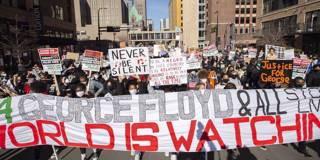The killing of George Floyd last May accelerated America's reckoning with its history of racial injustice, but the US has yet to emulate post-apartheid South Africa or Argentina and Chile after their bloody dictatorships. Ultimately, true and lasting change requires the direct involvement of political institutions.
NEW YORK – The start of the trial of former Minneapolis police officer Derek Chauvin has returned the spotlight to the racial reckoning that accelerated after May 25, 2020, when Chauvin’s knee ended George Floyd’s life. Since then, massive urban protests, the toppling of Confederate statuary, and culture wars on university campuses have led many to believe that a semblance of racial justice in America might finally be achieved. But to produce true and lasting change, America’s governing institutions will need to become directly involved.
Recognizing this, Representative Barbara Lee of California and Senator Cory Booker of New Jersey have introduced resolutions calling for a “US Commission on Truth, Racial Healing, and Transformation.” And Representative Sheila Jackson Lee of Texas and 169 co-sponsors have introduced H.R.40, which calls for the creation of a national commission to examine the legacy of racial injustice in the United States – from slavery to the policing and carceral abuses of the present. More to the point, the commission created under H.R.40 would ultimately address the controversial question of reparations for the descendants of slaves.
Though reparations have become a hot-button culture-war issue, Americans would do well to remember that the US government has already adopted such a policy. Under President George H.W. Bush, and then under President Bill Clinton, around 82,000 Japanese-Americans who had been interned in the US during World War II received reparations checks.

NEW YORK – The start of the trial of former Minneapolis police officer Derek Chauvin has returned the spotlight to the racial reckoning that accelerated after May 25, 2020, when Chauvin’s knee ended George Floyd’s life. Since then, massive urban protests, the toppling of Confederate statuary, and culture wars on university campuses have led many to believe that a semblance of racial justice in America might finally be achieved. But to produce true and lasting change, America’s governing institutions will need to become directly involved.
Recognizing this, Representative Barbara Lee of California and Senator Cory Booker of New Jersey have introduced resolutions calling for a “US Commission on Truth, Racial Healing, and Transformation.” And Representative Sheila Jackson Lee of Texas and 169 co-sponsors have introduced H.R.40, which calls for the creation of a national commission to examine the legacy of racial injustice in the United States – from slavery to the policing and carceral abuses of the present. More to the point, the commission created under H.R.40 would ultimately address the controversial question of reparations for the descendants of slaves.
Though reparations have become a hot-button culture-war issue, Americans would do well to remember that the US government has already adopted such a policy. Under President George H.W. Bush, and then under President Bill Clinton, around 82,000 Japanese-Americans who had been interned in the US during World War II received reparations checks.